 Petzlover
Petzlover Polish Tatra Sheepdog is originated from Poland but Russian Hound is originated from Russia. Both Polish Tatra Sheepdog and Russian Hound are having almost same height. Polish Tatra Sheepdog may weigh 15 kg / 34 pounds more than Russian Hound. Both Polish Tatra Sheepdog and Russian Hound has almost same life span. Polish Tatra Sheepdog may have less litter size than Russian Hound. Polish Tatra Sheepdog requires Moderate Maintenance. But Russian Hound requires Low Maintenance
Polish Tatra Sheepdog is originated from Poland but Russian Hound is originated from Russia. Both Polish Tatra Sheepdog and Russian Hound are having almost same height. Polish Tatra Sheepdog may weigh 15 kg / 34 pounds more than Russian Hound. Both Polish Tatra Sheepdog and Russian Hound has almost same life span. Polish Tatra Sheepdog may have less litter size than Russian Hound. Polish Tatra Sheepdog requires Moderate Maintenance. But Russian Hound requires Low Maintenance
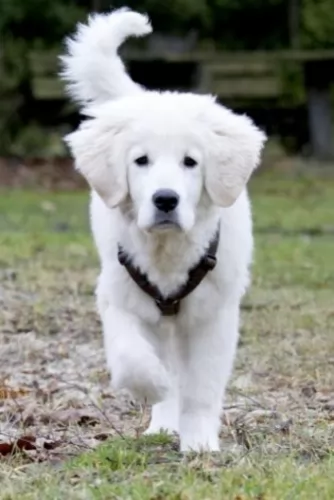 Known also as the Tatra Mountain Sheepdog, Polish Mountain Sheepdog or the Polski Owczarek, the Polish Tatra Sheepdog comes from Poland.
Known also as the Tatra Mountain Sheepdog, Polish Mountain Sheepdog or the Polski Owczarek, the Polish Tatra Sheepdog comes from Poland.
Shepherds were wanting an excellent guard dog for their livestock, and this dog has a natural instinct for guarding. Apart from being a good protection dog, the dog is also a superb companion.
This is a rare dog breed and not recognized by the AKC. This is actually an ancient breed, and the dog has lived in the Polish mountains for thousands of years. When the breed actually came about hasn’t been recorded. Some people suggest the Tatra Sheepdog comes from the Mastiff dog.
After the World Wars the dog’s number had been reduced and the Federation Cynologique Internationale started breeding the dog in the 1960s.
 There are sportsmen and hunters who appreciate the versatile Russian Hound. The Russian Hound has been a popular working breed in its homeland for a long time as it is an ancient dog breed.
There are sportsmen and hunters who appreciate the versatile Russian Hound. The Russian Hound has been a popular working breed in its homeland for a long time as it is an ancient dog breed.
This is an ancient dog breed, being developed by crossing common hunting dogs with indigenous ovcharkas and Laikas. Later European hunting dogs were also introduced into the mix.
The dogs numbers have declined but were later revived in the late 1800s. The first breed standard for the Russian Hound was created in 1896. Known as the Russkaya Gontchaya, this tough dog is still popular in all parts of Russia.
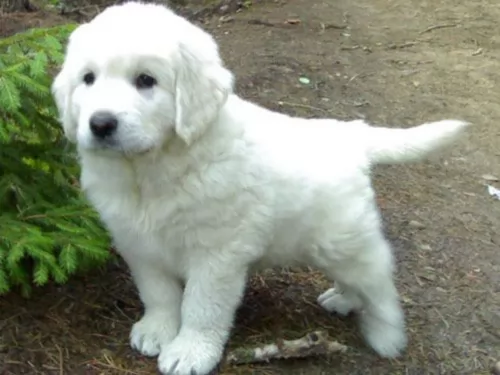 If you bring a Polish Tatra Sheepdog puppy into your home you might think you had a gorgeous Polar Pear Cub roaming around – that’s how cute they are.
If you bring a Polish Tatra Sheepdog puppy into your home you might think you had a gorgeous Polar Pear Cub roaming around – that’s how cute they are.
These are large, well built white coated dogs and the average height for them as an adult is between 60 to 70cm, male and female. Weight of the dog is between 36 and 60kg.
The double coat is medium length and thick. The ears are medium length and floppy and the tail is long and carried low when the dog is at rest, but it is carried up and over the back when the dog is alert and watchful.
These dogs have a lot of characteristics that make it such a good guardian dog. He is territorial, bold, protective, loyal and always loving towards his human family.
The Tatra has a loud bark and he uses this when he is wary of anything that he thinks may harm his family. He is an intelligent dog too, and you won’t have any trouble training and socializing him.
 The Russian Hound is a medium to large sized dog. He stands at roughly 62 – 67cm in height and weighs roughly 36 to 45kg. The dog however is available in a number of different sizes.
The Russian Hound is a medium to large sized dog. He stands at roughly 62 – 67cm in height and weighs roughly 36 to 45kg. The dog however is available in a number of different sizes.
The coat is fairly short and dense, becoming fuller in Winter. The coat color is fawnish with a darker brown, blackish saddle on the back. The paws have some white markings. The eyes are medium length and the tail is long and held down.
The Russian Hound is a peaceful, calm dog, not making a fuss around strangers, but accepting them well. He may be calm, but he is independent and strong willed.
Training and socialization will be good for him, making him obedient and well mannered.
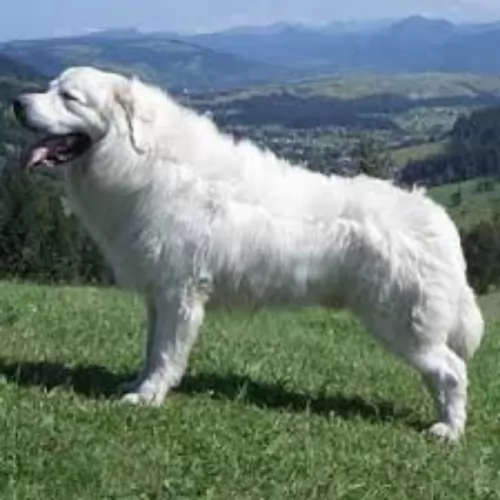 These large sheepdogs have always been guard dogs – they were bred to guard sheep and have always spent a lot of time on their own, away from humans.
These large sheepdogs have always been guard dogs – they were bred to guard sheep and have always spent a lot of time on their own, away from humans.
To many people, he may seem to be somewhat aloof and independent, but for people looking for a guard dog, this particular characteristic is particularly appealing.
Nonetheless, brought up with lots of love and care he makes the most devoted, loving pet.
 Everybody wants a peaceful, loving dog that can be a good pet and companion without causing a lot of trouble. The Russian hound is a peaceful, loving, loyal dog who is going to make any family a wonderful 4-legged fried.
Everybody wants a peaceful, loving dog that can be a good pet and companion without causing a lot of trouble. The Russian hound is a peaceful, loving, loyal dog who is going to make any family a wonderful 4-legged fried.
He can adapt to life in the city or the countryside so long as he is given a good loving home and plenty of exercise.
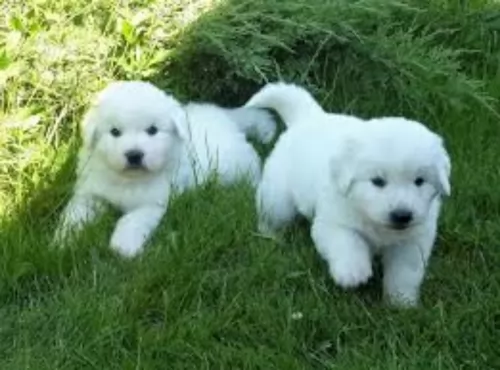 While your Polish Tatra Sheepdog isn’t likely to suffer from any major dog health issues if he is well fed, well exercised and loved, he may well succumb to one or two of some of the typical illnesses there are that plague dogs -
While your Polish Tatra Sheepdog isn’t likely to suffer from any major dog health issues if he is well fed, well exercised and loved, he may well succumb to one or two of some of the typical illnesses there are that plague dogs -
This is such a common- and serious problem with dogs, that it bears mentioning. Hip dysplasia is a problem with the hips so that the bones don’t fit- and move properly. The end result for the dog is pain, inflammation and swelling. Your dog is reluctant to play and get up again after lying down. Arthritis can set in which can also be painful. There are treatments to help with managing pain, but in some instances, surgery may be required.
Because the Polish Tatra Sheepdog is a deep chested dog, he is more prone to bloat, which is life threatening. Gas is trapped in the stomach, the stomach twists and the dog has a swollen stomach, is restless and in stress. Immediate veterinary intervention will be required.
This can be debilitating for your dog as he wants to be licking and scratching the whole time. Usually you’ll see this in the paw- and stomach area. There are a range of medications that the vet will suggest.
 The Russian Hound is a healthy breed. Nonetheless even the healthiest dog breeds can become ill.
The Russian Hound is a healthy breed. Nonetheless even the healthiest dog breeds can become ill.
Good food, exercise and lots of love and attention can ensure a long life for him.
However every dog can have one of the many common dog illnesses there are. Toothache can be a serious problem for your pet because if you don’t look in his mouth you won’t be able to tell if he has a bad, painful tooth.
Dogs can also break their teeth, causing sharp, jutting pieces which cut the gums. They can also get gum disease. Plaque can cause a whole lot of bacteria in your pets mouth. With the increase in bacteria, your dog’s health problems increase too. It is imperative to look in your pets mouth and speak to your vet about canine dental maintenance.
Eye infection are a common problem with dogs, and an eye infection can be from allergies. Yellow pus can indicate an infection. It is best to speak to your vet because some eye infections can lead to blindness if left untreated.
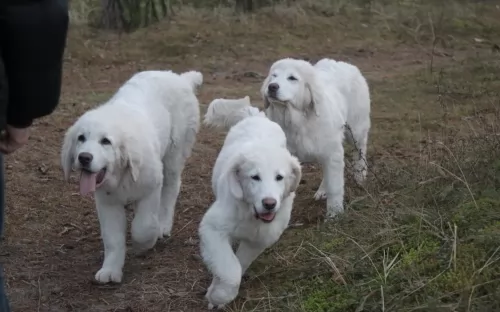 The Polish Tatra Sheepdog is an energetic dog and this means he will require a large sized garden to run around in. As a large, active dog he isn’t recommended for city living but would suit a large property where he can be well exercised. Because of its size and energy levels, regular walks will be recommended. Provide the dog with stimulating games that will be mentally and physically beneficial.
The Polish Tatra Sheepdog is an energetic dog and this means he will require a large sized garden to run around in. As a large, active dog he isn’t recommended for city living but would suit a large property where he can be well exercised. Because of its size and energy levels, regular walks will be recommended. Provide the dog with stimulating games that will be mentally and physically beneficial.
This large dog sheds, and seasonally too, so he will need to be brushed at least twice a week to prevent loose hair.
Check inside your dog’s ears for infection.
Trim your dog’s nails.
Check your dog for fleas and ticks and check him over for any unusual lumps.
Every pet lover wants their dog to live a long, healthy, active life. That is why it is so important to choose the best dog food.
If you buy commercially manufactured dog food, make sure its the high quality ones to ensure its properly formulated to provide your pet with all the vitamins and minerals he needs.
Home-made food is also an excellent choice for your pet. Boiled chicken, brown rice or pasta and spinach, sweet potatoes and carrots can be very healthy, and you can chop this up and add it into the dry kibble a couple of times a week. This is a super tasty treat. Some raw meat added in occasionally will do him the world of good.
Never leave your pet without a constant source of fresh, cool water.
 As a hunting dog, you will need to ensure your Russian Hound gets enough exercise. He will love his walks with you but will want to be let off his leash when in the park. He loves the opportunity to run free. Games at home in the garden will also be good for this large dog.
As a hunting dog, you will need to ensure your Russian Hound gets enough exercise. He will love his walks with you but will want to be let off his leash when in the park. He loves the opportunity to run free. Games at home in the garden will also be good for this large dog.
Provide your pet with a nice, warm, dry sleeping area.
Make sure your pet’s vaccines are up to date.
Have your dog neutered or spayed to prevent unplanned puppies.
Groom your Russian Hound by brushing him twice a week.
Check him over for lumps while brushing him.
Check inside his ears for signs of redness.
Trim his nails.
Look at his eyes and make sure they are clear with no signs of discharge.
Check inside the mouth for rotten or bad teeth as this can cause tremendous pain and also cause toxins to get into the bloodstream.
The Russian Hound relies on vitamin and mineral enriched food. The best commercially manufactured dog foods can provide this. These foods are wonderfully convenient. Try not to give your dog dry kibble day after day, but vary it twice a week with some home-made food.
Simply add into one big pot chicken, brown rice or pasta and spinach, sweet potatoes and carrots. This food can all be chopped up and added in to the dry kibble twice a week. It is wonderfully tasty for your your canine friend. Dogs thrive on simple, consistent meals. Ty and add some raw meat to his food occasionally.
Ensure there is always a bowl of fresh, cool water within his reach.